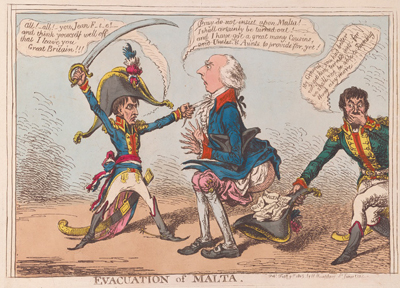Evacuation of Malta
Like many caricatures, the wit and meaning of the Evacuation of Malta depend upon a pun: evacuation as the emptying of the bowels, and as the removal of troops and defenses from a country. Not surprisingly this print was one of those designated as "suppressed" and conveniently relegated to the back pages of the Victorian Bohn edition of The Works of James Gillray along with other prints devoted (mostly) to fornication and defecation.

© Beinecke Rare Book and Manuscript Library, Yale University
The print features a diminutive but rapacious Napoleon Buonaparte grabbing Prime Minister Henry Addington by the neck cloth and demanding more territories. A terrified Addington is so distressed that he has lost control of his bowels and is (to use a peculiarly appropriate American expression) "shitting bricks." Those bricks are places like Egypt, Malta, and the Cape of Good Hope that Addington had promised to evacuate as part of the Treaty of Amiens. But he seems to be less concerned about ceding British hegemony than losing his place as Prime Minister along with the power of patronage. A French General collecting these spoils warns Napoleon not to press too hard lest Addington is replaced by another British leader who may not be so easily duped.
When he came into office in March 1802, bad harvests, burdensome taxes, and increasing treasury debt had made peace with France a high priority for Addington. Out in the war weary country, there was widespread support for Addington's policy among both Whigs and Tories. But to some of the Tories faithful to the previous Prime Minister (like George Canning and William Wyndham), the peace had been bought at too high a price. They suspected (correctly) that by agreeing to the peace, Napoleon was only buying time to build up his army and navy before launching further attacks on British interests. And as evidence of Napoleon's intentions mounted, faith in Addington's ministry diminished and reluctance to lose control of key strategic positions like Egypt and Malta increased. The following passage from the London Morning Post from January 24, 1802 (a couple of weeks before Gillray's print) is typical of what Gillray would have seen in numerous papers at the time.
Ten months have elapsed since the signing of the Definitive Treaty [of Amiens] , and in its most essential parts, it has not yet been carried into execution. Malta, Egypt, the Cape, are still in our hands; not so much, we suspect, on account of any etiquette, or want of formality in the surrender, as from this more solid reason, an apprehension that France will possess herself of them the moment we retire.
As everyone would have remembered, Malta was overrun by France at the start of Buonaparte's Egyptian campaign, providing (if it had succeeded) a gateway to attack British interests in India. As Addington recognizes (per Gillray), Malta would be the ultimate sticking point, and it was largely because of the apprehensions noted above that Britain ultimately broke the Treaty and declared war on France a few months later in May 1803.
Sources and Reading
- Commentary from the British Museum on Evacuation of Malta.
- "Treaty of Amiens," Wikipedia
- "Malta," Wikipedia
- "Henry Addington, 1st Viscount Sidmouth," Wikipedia
- "Napoleon," Wikipedia
- Thomas Wright and Joseph Grego, The Works of James Gillray, the Caricaturist; With the History of His Life and Times, p. 292-293.
Comments & Corrections
NOTE: Comments and/or corrections are always appreciated. To make that easier, I have included a form below that you can use. I promise never to share any of the info provided without your express permission.